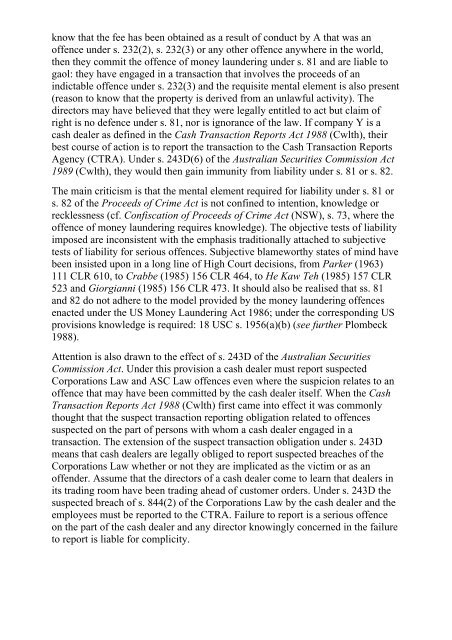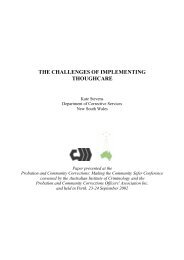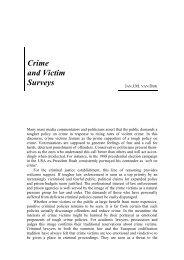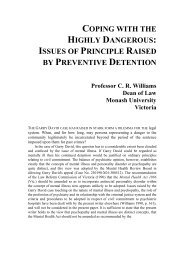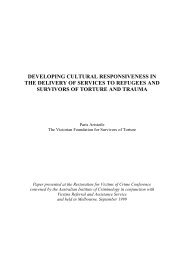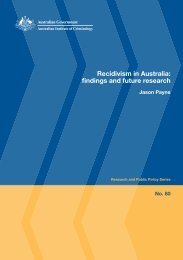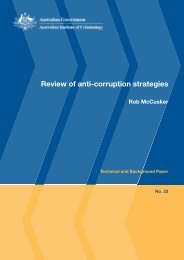Fraud and the liability of company directors - Australian Institute of ...
Fraud and the liability of company directors - Australian Institute of ...
Fraud and the liability of company directors - Australian Institute of ...
Create successful ePaper yourself
Turn your PDF publications into a flip-book with our unique Google optimized e-Paper software.
know that <strong>the</strong> fee has been obtained as a result <strong>of</strong> conduct by A that was an<br />
<strong>of</strong>fence under s. 232(2), s. 232(3) or any o<strong>the</strong>r <strong>of</strong>fence anywhere in <strong>the</strong> world,<br />
<strong>the</strong>n <strong>the</strong>y commit <strong>the</strong> <strong>of</strong>fence <strong>of</strong> money laundering under s. 81 <strong>and</strong> are liable to<br />
gaol: <strong>the</strong>y have engaged in a transaction that involves <strong>the</strong> proceeds <strong>of</strong> an<br />
indictable <strong>of</strong>fence under s. 232(3) <strong>and</strong> <strong>the</strong> requisite mental element is also present<br />
(reason to know that <strong>the</strong> property is derived from an unlawful activity). The<br />
<strong>directors</strong> may have believed that <strong>the</strong>y were legally entitled to act but claim <strong>of</strong><br />
right is no defence under s. 81, nor is ignorance <strong>of</strong> <strong>the</strong> law. If <strong>company</strong> Y is a<br />
cash dealer as defined in <strong>the</strong> Cash Transaction Reports Act 1988 (Cwlth), <strong>the</strong>ir<br />
best course <strong>of</strong> action is to report <strong>the</strong> transaction to <strong>the</strong> Cash Transaction Reports<br />
Agency (CTRA). Under s. 243D(6) <strong>of</strong> <strong>the</strong> <strong>Australian</strong> Securities Commission Act<br />
1989 (Cwlth), <strong>the</strong>y would <strong>the</strong>n gain immunity from <strong>liability</strong> under s. 81 or s. 82.<br />
The main criticism is that <strong>the</strong> mental element required for <strong>liability</strong> under s. 81 or<br />
s. 82 <strong>of</strong> <strong>the</strong> Proceeds <strong>of</strong> Crime Act is not confined to intention, knowledge or<br />
recklessness (cf. Confiscation <strong>of</strong> Proceeds <strong>of</strong> Crime Act (NSW), s. 73, where <strong>the</strong><br />
<strong>of</strong>fence <strong>of</strong> money laundering requires knowledge). The objective tests <strong>of</strong> <strong>liability</strong><br />
imposed are inconsistent with <strong>the</strong> emphasis traditionally attached to subjective<br />
tests <strong>of</strong> <strong>liability</strong> for serious <strong>of</strong>fences. Subjective blameworthy states <strong>of</strong> mind have<br />
been insisted upon in a long line <strong>of</strong> High Court decisions, from Parker (1963)<br />
111 CLR 610, to Crabbe (1985) 156 CLR 464, to He Kaw Teh (1985) 157 CLR<br />
523 <strong>and</strong> Giorgianni (1985) 156 CLR 473. It should also be realised that ss. 81<br />
<strong>and</strong> 82 do not adhere to <strong>the</strong> model provided by <strong>the</strong> money laundering <strong>of</strong>fences<br />
enacted under <strong>the</strong> US Money Laundering Act 1986; under <strong>the</strong> corresponding US<br />
provisions knowledge is required: 18 USC s. 1956(a)(b) (see fur<strong>the</strong>r Plombeck<br />
1988).<br />
Attention is also drawn to <strong>the</strong> effect <strong>of</strong> s. 243D <strong>of</strong> <strong>the</strong> <strong>Australian</strong> Securities<br />
Commission Act. Under this provision a cash dealer must report suspected<br />
Corporations Law <strong>and</strong> ASC Law <strong>of</strong>fences even where <strong>the</strong> suspicion relates to an<br />
<strong>of</strong>fence that may have been committed by <strong>the</strong> cash dealer itself. When <strong>the</strong> Cash<br />
Transaction Reports Act 1988 (Cwlth) first came into effect it was commonly<br />
thought that <strong>the</strong> suspect transaction reporting obligation related to <strong>of</strong>fences<br />
suspected on <strong>the</strong> part <strong>of</strong> persons with whom a cash dealer engaged in a<br />
transaction. The extension <strong>of</strong> <strong>the</strong> suspect transaction obligation under s. 243D<br />
means that cash dealers are legally obliged to report suspected breaches <strong>of</strong> <strong>the</strong><br />
Corporations Law whe<strong>the</strong>r or not <strong>the</strong>y are implicated as <strong>the</strong> victim or as an<br />
<strong>of</strong>fender. Assume that <strong>the</strong> <strong>directors</strong> <strong>of</strong> a cash dealer come to learn that dealers in<br />
its trading room have been trading ahead <strong>of</strong> customer orders. Under s. 243D <strong>the</strong><br />
suspected breach <strong>of</strong> s. 844(2) <strong>of</strong> <strong>the</strong> Corporations Law by <strong>the</strong> cash dealer <strong>and</strong> <strong>the</strong><br />
employees must be reported to <strong>the</strong> CTRA. Failure to report is a serious <strong>of</strong>fence<br />
on <strong>the</strong> part <strong>of</strong> <strong>the</strong> cash dealer <strong>and</strong> any director knowingly concerned in <strong>the</strong> failure<br />
to report is liable for complicity.


